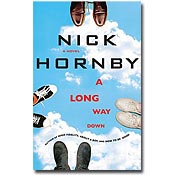
Last year, on the op-ed page of the New York Times, Nick Hornby went absolutely frothing-mouth mad over an obscure Philadelphia bar band called Marah. He likened the experience of watching them perform to the famous story about a rock journalist who, after witnessing a show at a Jersey Shore dive, went home and wrote, “I saw rock and roll future, and its name is Bruce Springsteen.” (And then, smart guy that he was, he switched careers and guided Bruce to worldwide fame.)
Hornby allowed that Marah was unlikely to reach such heights, but he suggested that the loss was ours. Although most artists these days pander either to the bland desires of the masses or to the picayune obsessions of elitists, Hornby argued, Marah achieved a higher purpose: “the increasingly tricky art of making us glad we’re alive.”
On the evidence of A Long Way Down, this notion has apparently stuck hard in our author’s mind. The inescapable theme of Hornby’s fourth novel is “Choose life.” For maximum dramatic effect, the story starts on the brink of death: Four strangers converge on the roof of a tall North London building on New Year’s Eve, each of them intending it to be their last night on earth. It’s a tidy premise with the simple contours of a Hollywood pitch—Johnny Depp has already purchased the film rights—and believe me, I’m not giving away too much when I reveal that none of them actually takes the plunge. Forced to see life through eyes other than their own, they reconsider their fates.
What ensues is an odyssey that might best be explained as a modern, profane version of The Wizard of Oz. As a stand-in for Dorothy, we have wigged-out party girl Jess—the unloved teenage daughter of a minor official in the Blair government—whose erratic personality drives much of the plot. The part of the Lion is assumed by Martin, a disgraced morning-television host who must find courage; JJ, a failed rock star and jilted lover, plays the Tin Man; and Maureen, a sweet but addled middle-aged single woman whose adult life has been consumed in caring for a son who never learned to walk or talk, is the Scarecrow.
As in the original Oz, these characters are after something they already possess; they just have to locate it within themselves. But sadly, there isn’t all that much serendipitous fun along Hornby’s Yellow Brick Road. In fact, you can’t help wondering why these characters don’t just flee from one another the first chance they get. Yes, they are bound by their shared despondency—but given that they never develop the slightest affections or empathy, why exactly do they agree to meet up at a Starbucks? Why in the world do they take off together to vacation in the Canary Islands? The novel begins to stagger and lurch under the weight of these implausibilities, and only through his vast powers of congeniality does Hornby keep it all going. Until, that is, the final “intervention” scene, which has all the contrived ridiculousness of a reality-show climax.
As a storytelling device, Hornby shifts the narration swiftly from character to character, and this technique generally plays to his strengths. As we’ve known since High Fidelity, Hornby is a master of internal monologue, and his prose has enviable ease and wit. Amid the despair, Hornby treats us to some delightfully silly episodes. At one point, poor Maureen, dragged to a party, is struck dumb by what she encounters in the bathroom. “Somebody was kneeling on the floor and sniffing the lid,” she says. “I have no idea why anyone would want to smell the lid of a toilet. (While someone else watched! Can you imagine?) But I suppose people are perverted in all sorts of different ways.”
Just as he has difficulty holding the plot together, though, Hornby finally fails at this feat of literary ventriloquism, too. Though there are some genuinely touching moments (like when Maureen describes the toys and posters she buys for her uncomprehending son), the characters’ voices tend to blur into one that sounds distractingly like Hornby’s own. Eighteen-year-old Jess improbably theorizes about the breakup of the Beatles while Maureen riffs that “being gay was a bit like the Olympics. It disappeared in ancient times, and then they brought it back in the twentieth century.” It’s admirable, I suppose, that Hornby attempts such an ambitious chorus. But the way it plays out is rather lazy, as if simply stamping the characters with varied demographics were the same as lending them inner lives. The failure of these narrations eventually undercuts Hornby’s central theme: that through empathy, we can find purpose in life.
Still, Hornby’s many devoted fans are unlikely to be put off by these shortcomings. They’ll be happy just to be back in his engaging company. When JJ declares that “I had wanted to kill myself, not because I hated living, but because I loved it,” they might be moved as if by a stirring rock ballad. I only wish it didn’t sound, to my ears, suspiciously like Lite FM.
A Long Way Down
by Nick Hornby.
Riverhead.
352 pages. $24.95.